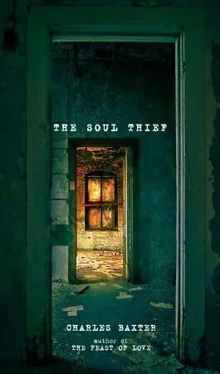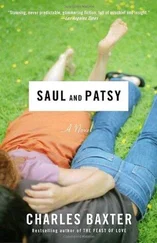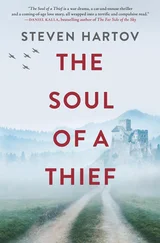“People are after you,” Nathaniel says to her.
“What?”
“People are after you. Those two, Coolberg and Theresa.”
“They are not after me. She may be jealous, but that’s her problem, not mine.”
“No, I think they’re really after you.”
“Honey. Nathaniel. You are really messed up. You should get help.”
“There’s something I have to do,” Nathaniel tells her. “I love you, Jamie, please, and I have to do this right now.” More foolishness, maybe, but none of his actions are under his control. He stands up and takes her hand — she does not resist this time, as he thought she might — and he guides her into the bathroom. He sits her on the bathtub’s edge, and he squats down to unlace her shoes, first the left, then the right. Kneeling before her, he takes her sneakers off. Jamie watches him quietly, unprotesting. He peels off her white socks, then grabs a washcloth.
“Oh, no,” she says.
Quickly he dips the washcloth into a stream of warm water and begins to wash her feet. He can feel her resistance, as she tenses her muscles and tendons, before that tension gives way to the sheer force of her astonishment.
“What are you doing?”
He does not look up. “I love you,” he says, keeping his eyes down. Tears are rolling off his cheeks. He does not wipe them away. When his task is completed, he tosses the washcloth on the floor, like any ordinary man. Out of abjection and pure longing, he bows his head before her. He waits.
Jamie takes Nathaniel’s face in her hands and lifts it so that she can look at him. “All right,” she says, the tears coming into her own eyes, laughing, shaking her head. “All right,” she tells him, “take me to bed. Make me late to work.”
“That’s not what I’m telling you. That’s absolutely not what I’m asking for here.”
“I know what you’re asking for,” Jamie says equitably. “But this is all you’ll get.”
Half an hour later, his eyes closed, then suddenly opened, tears and sweat dripping down onto her, he calls out her name, and in response Jamie comes at the same time that he does. Her facial expression is one of pleasure mixed with horrified surprise. After a moment — she has broken out into quick shocked laughter — he looks into her eyes and imagines that her spirit, without knowing how or why, has suddenly disobeyed the force of gravity that has governed it. Her soul, no longer a myth but now a fact, ascends above her body. Like a little metallic bird unused to flight, unsteady in its progress, her soul rises and falls, frightened by the heights and by what it sees, but excited, too, by being married to him for a few seconds, just before it plummets back to earth.
BACK IN HIS APARTMENT,more clothes seem to be missing, more objects burglarized. The Escher print has disappeared from the wall; the phone is gone. The notebook on the desk appears also to have been filched. You’d think someone would at least leave a thank-you note. Outside the window, down the block, an old woman wearing a grotesquely jaunty Easter bonnet keeps him under surveillance from behind her loaded-down grocery cart.
Nathaniel goes into his bedroom. It is dinnertime. The apartment is feasting on subtractions. In a few days they may take his name away along with his address. Who or what could possibly stop them? Still, he will fight them. A few objects still remain here, unstolen. A book on the bedspread, the Brownstone Eclogues of America’s forgotten great poet, Conrad Aiken, whom even burglars don’t want to read, remains open to the stanzas he had been studying the day before. The poems consist of complicated farewell gestures to vanishing elements of American life — including the ordinary virtues. These poems, the intruders haven’t taken. Perhaps they don’t care for the art of verse. He gazes down at the closing lines from “The Census-Takers.”
And we are the census-takers; the questions that ask
from corner and street, from lamp-post and sign and face;
The questions that later tonight will take you to task,
When you sit down alone, to think, in a lonely place.
Did you ever play blind-man’s buff in the bat-flit light?
Stranger, whose heart did you break? and what else did you do? —
The census-takers are coming to ask you tonight;
The truth will be hurrying home, and it’s time you knew.
Absolutely right. It’s time you knew. The lines have the quick comic jokiness, the perky melodramatic intelligence, of everyday despair. Meanwhile, Nathaniel stands up, sits down, kneels. He reads while fidgeting. He can no longer sit still. A prayer is coming upon him. When the spirit of prayer arrives in the bat-flit light, he must give way to it.
There is no organized religion whose articles of faith Nathaniel believes in. So when he prays, he has nothing to go on. He lacks authority figures and trustworthy spiritual guides. He prays sitting down or standing up or lying flat on the floor with his face bordered by his outstretched arms like a penitent. In his private faith are several articles: Life is a gift and is holy. Love is sacred. Existence is simple in its demands: We must serve others with loving-kindness. Some entity beyond our knowing is out there. Nathaniel believes that this unknowable force is paying attention to him. He has no idea why. The God that watches and loves him cannot be a personal God. Also: Is God, as the theologians insist, perfect? Somehow he doubts it. But he feels as if he knows as much about God as an ant knows about the room into which it creeps and crawls. Which is to say that he acknowledges that he knows nothing about God.
So today, now, this evening, he puts down the book and lies on the floor, placing his forehead on the linoleum tile. His penis is still thick from his lovemaking with Jamie. His body, wracked with discomfort, spreads itself out flat. That is how it should be. The words travel up out of his mind into the great nothingness.
Thank you for my life, he thinks, thank you forever and always. Thank you for the gift of this woman who is also holy and sacred to me. Thank you for the sight of her and for my joy in her company and for her moment of joy also with me. Thank you for my guardian, Gertrude Stein. Blessings upon all the poor and unfortunate. May they be given food and love as I have been given these gifts. Suffering is necessary, I know. I do not know why it is necessary but I know that it is. Blessings upon all children and all innocent creatures such as animals at the zoo. Blessings upon those who suffer. May their sufferings be relieved. Blessings upon my dear mother and my kindly stepfather and my poor sister. Why have I been called a devil? For myself I ask for very little. But I ask for your care for this woman I love, for Jamie Esterson, who has danced for you, and I ask that no harm come to her. May nothing harm her now, I beg of you.
Then everything goes dark.
ALL THIS HAPPENEDa long time ago.
These days I work in a local arts agency writing up grant proposals. Our office puts poets (and sometimes out-of-work actors and musicians and dancers) into the schools. I am rather good at the work I do and take some pride in it. I’m able to give a sense of urgency to the project descriptions. A certain studied eloquence is not beyond my reach. I have a good track record for landing foundation money. I can point to successes. People believe me.
For a brief period a few years ago I worked as an insurance adjuster but found the job distasteful — I had to go around discounting distress. My task was to soft-pedal the damages. After flooding, after windstorms, after fire, I showed up to say, “Well, that’s not so bad.” You can’t do such work for very long without suffering the consequences. The victims of calamity end up despising you. Years before my days as an adjuster, I served as an assistant editor for a small-town newspaper — I did some copyediting and reporting and sold advertising space. Before that, I was assigned to the role of the seemingly amiable person at the other end of the line to whom you talk when you call to ask about your utility bill. Prior to my time at Amalgamated Gas and Electric, I made phone calls — very briefly — at a collection agency. Early in my life as a working man, I delivered the mail.
Читать дальше












